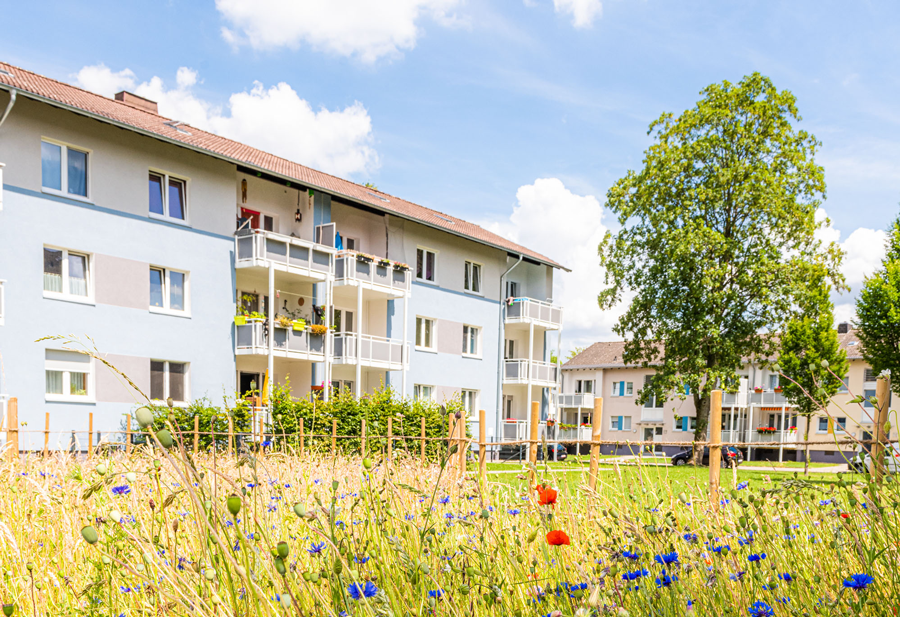Environment and Climate
GRI
103-1
103-2
103-3
305-4
305-5
UNGC
Principle 7
Principle 8
Principle 9
SASB
IF-RE-130a.1
Disclosure
In July 2021, several regions near the Ahr and Erft rivers were struck by a once-in-a-century flood due in part to the heaviest rainfall since records began. The striking images of the devastation that the event caused in Germany and Belgium made it abundantly clear that climate change is no longer just an abstract scientific problem. The impact of climate change is only going to become more significant, and we are not going to be immune to its effects in this part of the world.
The events in the summer of 2021 provided yet more evidence that limiting global warming and protecting the natural resources required for life on earth are one of the most important challenges facing us as a society. That is why environmental and climate protection have such an important role to play in our sustainability strategy. We support targets set at an international level, such as the 1.5°C target set out in the Paris Agreement and the European Union Green Deal, as well as the goal set by the German Federal Government in 2021 to achieve climate neutrality by 2045. The Austrian government is going even further, and wants to be climate neutral by 2040. The world of business has an active role to play in achieving this target. It can also drive the research and development that will be needed in order to reach global climate targets. The real estate sector has an important part to play in this because the construction and operation of buildings emit a significant amount of the greenhouse gases that cause climate change. As the housing industry market leader in Europe, we aim to be a central driving force behind climate protection. With a portfolio of 413,967 residential units (excl. Deutsche Wohnen) in Germany, Austria and Sweden and its involvement in a number of wide-ranging development activities, Vonovia has a significant role to play in protecting our environment and mitigating climate change.
- Climate path for the existing German portfolio updated: virtually climate-neutral building portfolio by 2045 set as target (<25 kg CO2e/m² by 2030)
- Carbon intensity in Germany improved by 2.8% to 38.4 kg CO2e/m²
- 2.3% refurbishment rate achieved in Germany
- Decarbonization tool for implementing environmental targets on regional and neighborhood levels. Neighborhood approach also a focal point of climate protection
- Serial refurbishment in line with Energiesprong principle piloted
- 1,000th roof fitted with photovoltaic system. New target set for expansion: installation of PV systems of >200 MWp on 17,000 roofs
- BUWOG in Austria becomes partner in “klimaaktiv Pakt2030” with the goal of reducing emissions by 55% by 2030 against the base year of 2005
A decentralized energy transition is vital in order for the climate action plan being taken by governments and companies to be successful. Residential real estate companies can make an important contribution in this area while also opening up new business areas for themselves. Their properties offer great potential for generating renewable energies, e.g., by using photovoltaic or solar thermal installations on roofs. This provides the basis for innovative schemes like landlord-to-tenant electricity models – prospectively also for heat pumps and charging infrastructure. This approach puts Vonovia in a position to make use of the opportunities that will arise as a result of our increasing demand for renewable energy and the transformation underway in the transport and energy sectors. We also believe that there is significant potential for Vonovia to drive innovation within the residential property sector while remaining at the forefront of the energy revolution and achieving our own climate targets. Of course, we need a suitable statutory and technological framework in order for this to be successful.
Climate action and protecting the environment are becoming increasingly relevant topics in wider society. As a listed company, our activities and transparency in the area of climate change mitigation reflect the increasing importance of this topic for our customers and shareholders. They are also a response to changes in the regulatory requirements that affect how we do business. The growing demand for sustainable investments and the Sustainable Finance action plan set out by the EU Commission have the potential to transform our financial markets, as do the EU Taxonomy for sustainable activities and the TCFD framework (see Implementation of the Recommendations Made by the Task Force on Climate-related Financial Disclosures (TCFD)).
The steps that will be required in order to reach the targets of the Paris Agreement and the European Union Green Deal will also be of importance for Vonovia. The extent of the impact that we have on the environment is dependent on how we choose to go about building new residential units and managing our existing portfolio. The same is true for the choices that we make about the ecological environment of our buildings. Maintaining and improving biodiversity in our residential environments is one positive step that we can take in order to protect the environment. We are also committed to conserving resources and contributing to the circular economy whenever possible.
The topics discussed in this section provide the framework for our activities, and are assigned to the two material topics that come under the area of Environment and Climate: Reducing CO2 in the Real Estate Portfolio/Energy-efficient Modernization and Renewable Energies and Energy Mix. The other important topics in this section are Biodiversity, Water, Waste and Effluents and Energy Efficiency and Carbon Reductions in Operations. The important topic of Innovations for Climate and Environment is a central theme that is primarily presented under the material topics.


